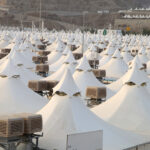The 2012 report placed Nigeria behind China and India, as countries with large population without adequate water supply and sanitation coverage. Nigeria also occupied the 130th position on the Global Water Poverty Index of developing countries still battling with water and sanitation accessibility. Based on this scenario, experts insist that if tangible efforts are not made to achieve the water and sanitation goals of the Millennium Development Goals (MDGs), efforts to attain the other goals of ending poverty, achieving food security, improved health and economic empowerment will remain futile.
Nigeria is one of the countries that were adjudged to be “off-track” in meeting the water and sanitation targets of the MDGs by 2015, due to lack of coordination, abandonment and poor funding of various water projects.
According to available statistics, Nigeria’s land area is about 91 million hectares. Out of this figure, 82 million hectares are arable but only 42 per cent of the lands are currently under cultivation due to inadequate water resources. Nigeria has about 264 medium and large dams with a combined storage capacity of 33 billion cubic metres of water. Of these dams, 210 are owned by the Federal Government, 34 are owned by states, while 20 are owned by private organisations. The dams, which have about 350,000 hectares of irrigable land in their vicinities, are largely underutilised. The Presidential Committee on Projects’ Implementation set up by the Federal Government in June 2012 inspected water projects spread across the country. The inspection was undertaken to analyse the immediate and long-term potential of the water projects in the six geopolitical zones of the country as well as the challenges facing them.
A total of 111 water projects at different stages of construction and rehabilitation were inspected: 33 of these are dams, 40 are water supply schemes, while others are irrigation projects. As a result of the project assessment tour, 57 irrigation projects were earmarked for rehabilitation. In addition, the Water Sector Reform and Public Private Partnership Unit was established in the Federal Ministry of Water Resources to boost synergy among all tiers of government, development partners and private organisations in water projects. Mrs Sarah Ochekpe, the Minister of Water Resources, said that there were 14,000 dysfunctional hand-pump boreholes across the country, pledging that 1,000 of them would be rehabilitated. Besides, the minister noted that over 44 per cent of the country’s water facilities were dysfunctional.
“Over the years, the Federal Government has invested substantial funds toward the provision of potable water supply infrastructure across the country, as part of efforts to attain the MDGs. “However, the infrastructure, particularly the hand pump boreholes, had rapidly deteriorated due to lack of adequate maintenance,’’ she added. Ochekpe, nonetheless, reiterated Federal Government’s commitment to increasing water and sanitation coverage in the country. “This will be done through participatory investment by the three tiers of government, the private sector and the beneficiaries with the following targets: “Increased rural water supply coverage from 44 per cent to 60 per cent by 2012 and to 75 per cent by 2015; from 32 per cent to 65 per cent in the area of sanitation by 2015. “Increased urban water supply from 65 per cent to 70 per cent by 2012; 85 per cent by 2015; and 100 per cent by 2025 to meet the African Water Vision target.’’
However, stakeholders have been proposing strategies for the completion of the numerous abandoned water projects. They particularly stress the need for community participation and the training of local manpower in the water sector. They believe that if beneficiary communities are involved in the execution of water projects, efforts will be made to ensure their timely completion. They, however, stress the need for the proper scrutiny of “constituency projects’’ relating to water. Meanwhile, Oba Michael Adesina, the Olowu of Owu-Ijebu, has called on lawmakers and politicians to desist from the misuse of water budgets. “Some people because of their privileged positions in the legislature say they want constituency projects; then, they take government money to execute a project that probably does not rhyme with national water supply schemes. “The money that should have been used to benefit all, a few people will use it in their constituencies and that reduces the budget available for the ministry and water corporations in various states. “Constituency projects are hardly completed; in fact, less than 25 per cent of the projects are completed and the money is fully spent,’’ Adesina said. The traditional ruler also stressed the need for the timely release of funds for the execution of water projects by all tiers of government. All the same, experts call on the Federal Government to do all within its powers to ensure the completion of all water projects. The fulfilment of the Agricultural Transformation Agenda, Water Sector Reforms, the MDGs and Vision 20:2020 depend solely on the citizens’ access to water supply, they add.
(NAN)
 Join Daily Trust WhatsApp Community For Quick Access To News and Happenings Around You.
Join Daily Trust WhatsApp Community For Quick Access To News and Happenings Around You.


